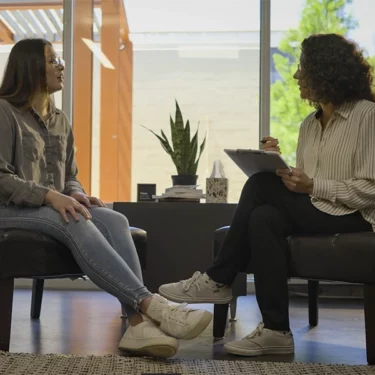Reducing adverse childhood experiences (ACEs) is a top priority for mental health and substance use treatment providers in California. Orange County’s MIND OC is paving the way by leading a cross-sector coalition of organizations dedicated to building a trauma-informed network of care. Karen W. Linkins, PhD, Chief Innovations Officer, and Andrea Mander, Senior Project Manager, share their insights about the impact of their trauma-informed work.
Tell us about your organization and the important work you’re doing.
Karen W. Linkins: MIND OC is a 501(c)(3) organization that was established in 2018 to support the Be Well OC movement in Orange County, Calif. The movement is a cross-sector coalition of organizations working together with the goal of uniting people around the vision of having a world-class behavioral health system. There are more than 700 organizations and countless individuals involved in this work.
How did you first get involved in this movement?
Andrea Mander: When the ACEs Aware opportunity came up at the state level, we brought a group of organizations together to respond to the RFP and coalesce around the goal of building a trauma-informed network of care. We recognized that while a lot of trauma-informed resources exist in Orange County, they need to be better aligned and coordinated to create a system of care. Together with more than 20 organizations, we started identifying gaps and bringing new entities to the table to bolster the clinical side and address social determinants of health throughout the community.
What role does MIND OC play in this coalition?
KW: We’re bringing entities together to create the conditions to have a trauma-informed network that includes service providers trained in ACEs [adverse childhood experiences]. No one sector can do it alone. It takes a community-driven process. We’re taking a health equity approach by leveling the playing field and putting community first. That includes ensuring critical partners aren’t being left out and that organizations closest to individuals in need are part of the work. The idea is to move toward a collective impact together.
Our work doesn’t stop with addressing ACEs. We are focused on upstream success, and that includes promoting health equity more broadly. How can we meet people who are experiencing trauma where they are? How can we be more prescriptive with our trauma-informed care? As a coalition, we are focused on supporting all aspects of community health. We are addressing stigma, enhancing the current system of care, improving crisis response and so much more – ACEs fits right into that.
What are some ACEs-related issues you’re tackling through the coalition?
AM: A barrier that comes up quite a bit has to do with a lack of knowledge. In many cases, providers are hesitant to conduct ACEs screenings because they don’t know who to send the patient afterward. There’s no standardized system to make sure the right connections are being made. We’re building a clearinghouse platform to facilitate referrals to clinical providers during these screenings, so once the provider identifies if a child has experienced a traumatic event or toxic stress environment, they can connect them to the appropriate resources and then follow up with families.
In Orange County, there are least four or five resource directories made available to the community. They’re difficult to navigate because people don’t know which ones to use, so the solution we came up with is to create an easy-to-navigate and accessible clearinghouse. Our goal is to create a scenario where community-based organizations and users only have to input information once, then it populates all of the available directories for referrals. We’re in the nascent stage right now but getting resource directory entities to agree to participate has been quite an accomplishment!
How else is the coalition addressing trauma prevention in your community?
KW: It’s important to understand the way we structured our coalition. We have distinct work groups that collaborate with each other. There’s a community clinical work group that’s uniting community-based organizations and clinical entities to create workflows and expand the current work being done. There’s a work group focused on developing the clearinghouse platform I just mentioned. And there’s a work group that’s helping to frame what we mean by equity and inclusion in Orange County. We are creating a framework people can understand, respond to and align with, and we’re guiding critical conversations around what we mean about equity, racism and impact when it comes to accessing care.
What else would you like people to know about your work?
AM: That we are committed to this being a multi-sector approach. This is one of the first times in Orange County where you have first responders, the department of education, county behavioral health clinics, health care agencies, community based organizations, Medicaid-managed health care plans and major health systems coming together to collaborate around a topic like this. Real change doesn’t happen in a silo. We all have these silos going in the same direction, but not in a cohesive way, so we’re addressing that together.
Where can people go to learn more or get involved?
KW: You can visit ACEsAware.org to learn more. As far as the work we’re doing in Orange County, we are working on a webpage that will live on the BewellOC.org website. If you’re in town and want to get involved, visit BeWellOC.org or email us. We’re always looking to extend our community engagement and make more connections within the community!
Guest Author
Chief Innovations Officer, Mind OC and Senior Project Manager, Mind OC
Mind OC



